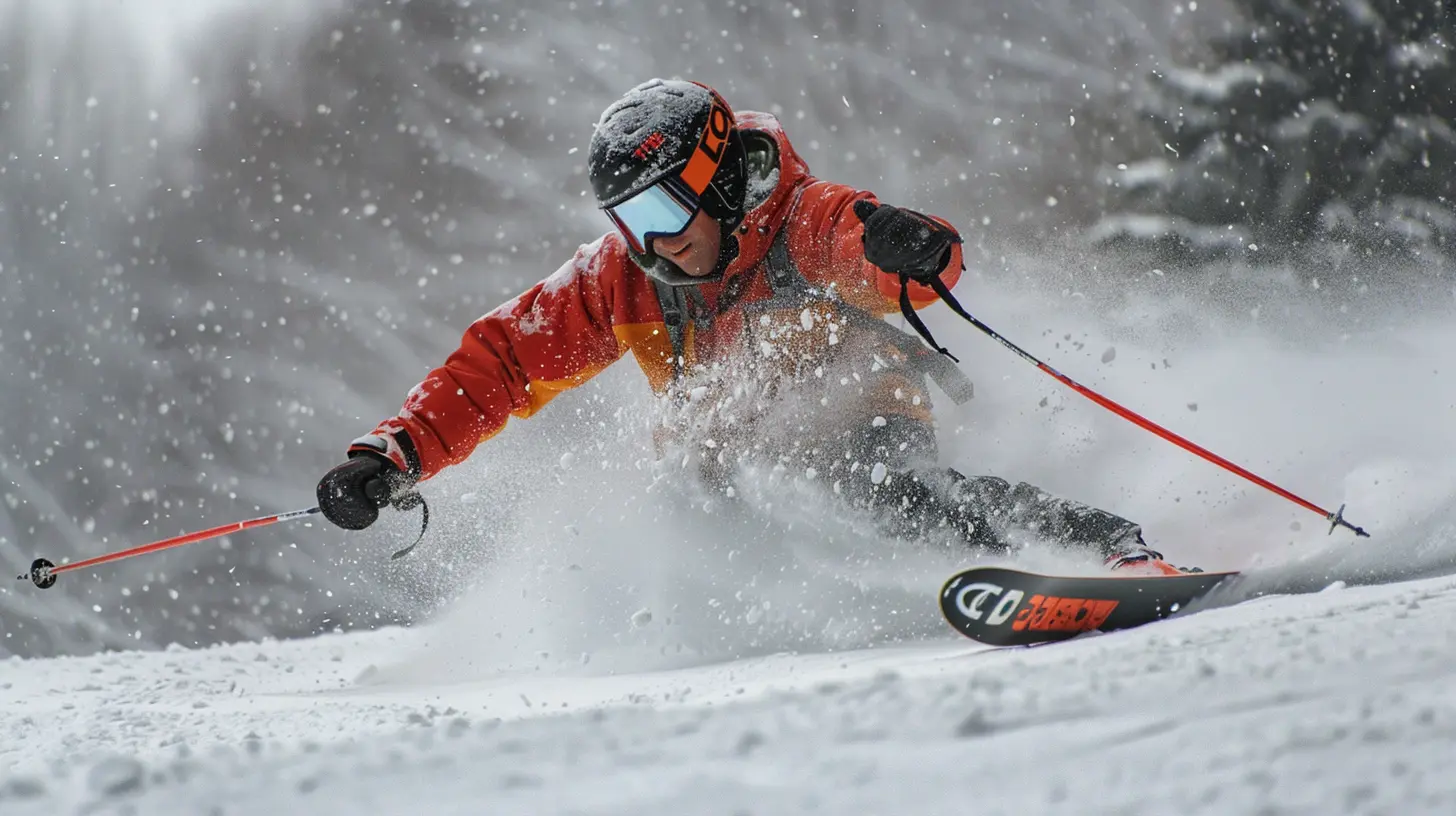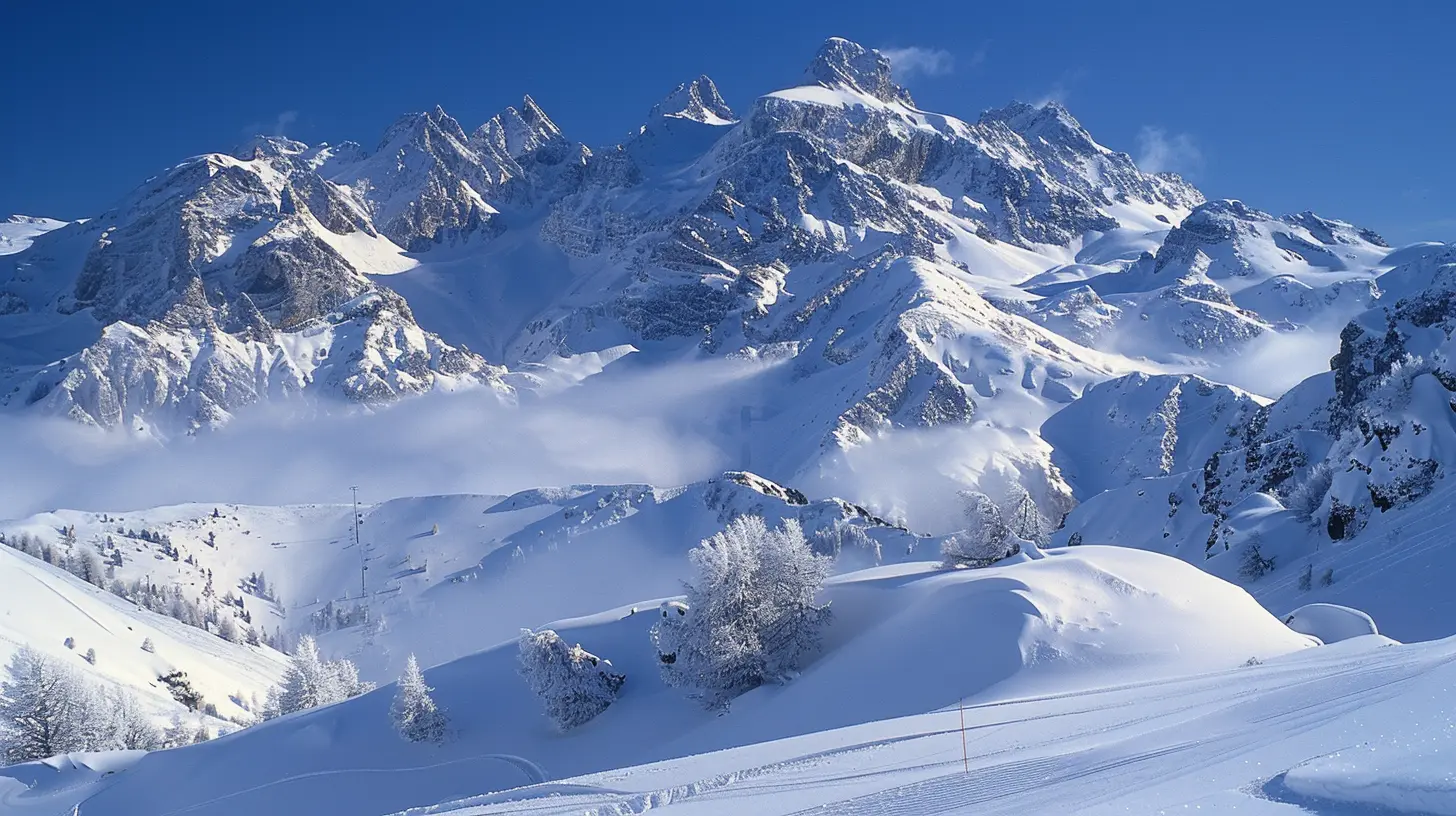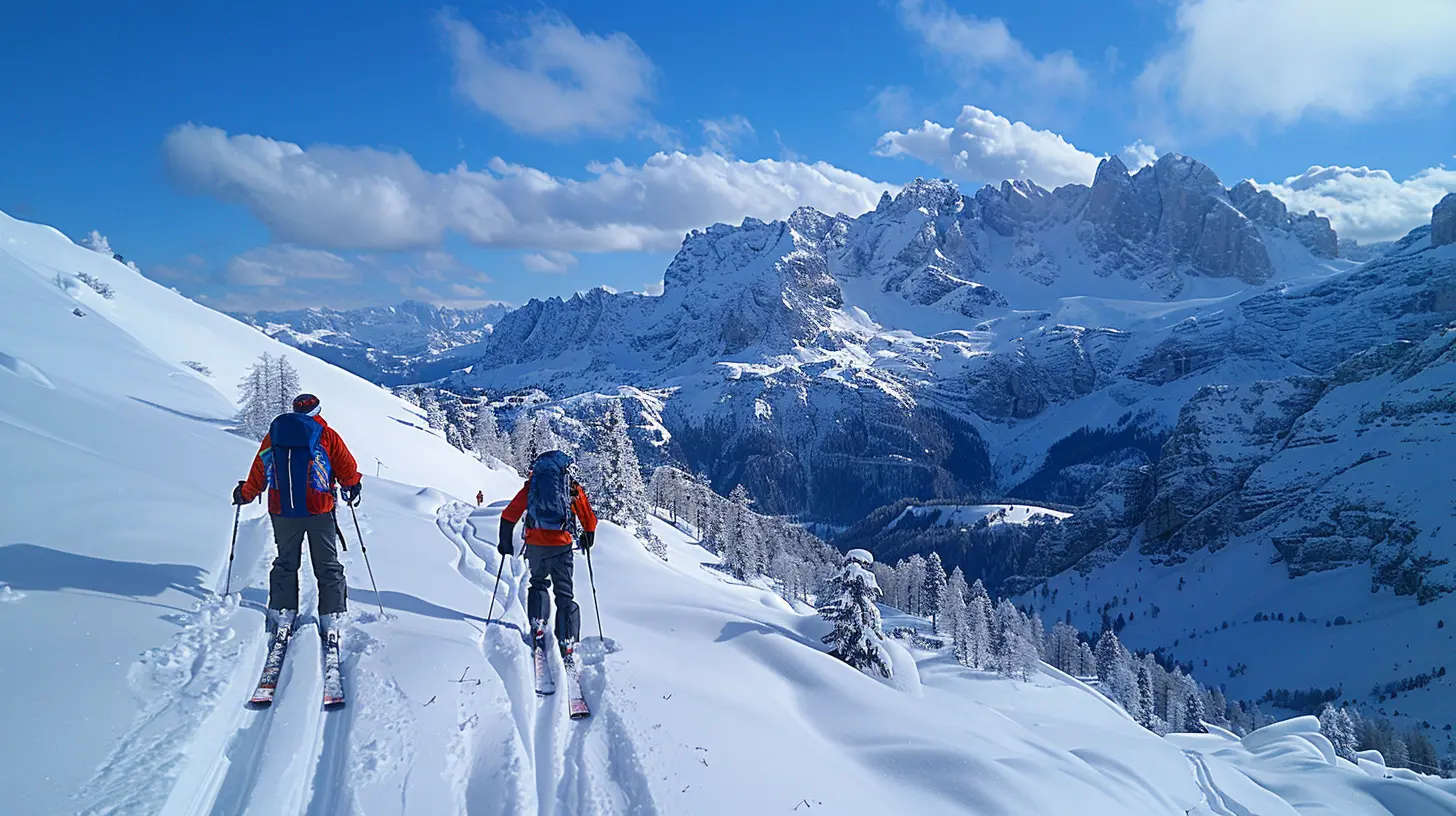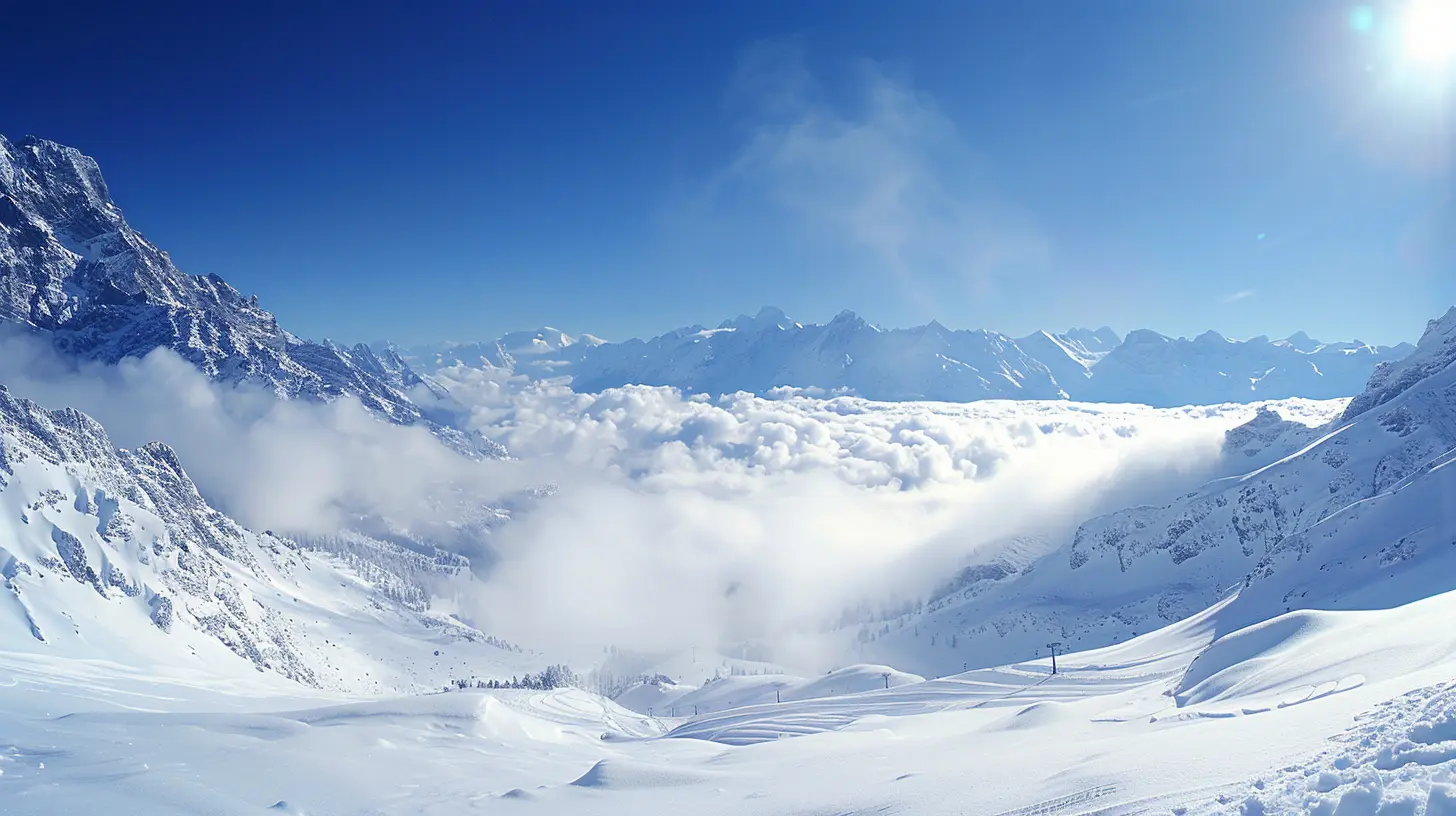The Role of Altitude and How to Handle High Elevation Skiing
23 November 2024
Skiing at high altitudes can be an exhilarating experience. The fresh powder, breathtaking views, and the sheer thrill of being on top of the world are unbeatable. However, there's a hidden challenge that many skiers underestimate: the altitude itself. Whether you're a seasoned skier or someone who's just strapped on skis for the first time, understanding the role of altitude and how it impacts your body is crucial for a safe and enjoyable experience.
In this article, we'll dive deep into the effects of altitude, how to prepare for high-elevation skiing, and tips to make your time on the mountain as smooth as possible. So, if you're ready to take your skiing to new heights (literally), let’s get into it!

What Happens to Your Body at High Altitude?
Before we talk about how to handle high-elevation skiing, let’s first understand what happens to your body when you're up there.As you ascend to higher altitudes, the air becomes thinner, and there's less oxygen available. You may have heard the term "thin air." Well, it’s not just a catchy phrase; it's real science. Higher elevation means fewer oxygen molecules per breath, which can lead to some noticeable changes in your body.
Oxygen Deprivation
At sea level, your body is used to a certain amount of oxygen with every breath. When you go higher, your body has to work harder to get the oxygen it needs. This can leave you feeling fatigued faster than usual, even if you're in good shape. Your muscles, which are used to getting a steady supply of oxygen, might start to feel heavier and tire out quicker. You might also notice that simple things like walking up a flight of stairs or carrying your gear feel more exhausting than they would at lower elevations.Altitude Sickness (Acute Mountain Sickness)
Altitude sickness is a very real concern and can affect anyone, regardless of fitness level. Symptoms usually kick in at elevations above 8,000 feet, but some people might feel them even lower.Common symptoms include:
- Headaches
- Nausea
- Dizziness
- Fatigue
- Shortness of breath
In more severe cases, altitude sickness can lead to confusion, vomiting, or even fluid buildup in the lungs or brain, which requires immediate medical attention.
Dehydration
At high elevation, the air is not only thin, but it’s also dry. You lose more water through respiration at altitude than you do at sea level. Combine that with the physical exertion of skiing, and you’re looking at a recipe for dehydration if you’re not careful.
How to Prepare for High Elevation Skiing
Now that we know what happens to the body at altitude, let’s talk about what you can do to prepare for those high-elevation runs.Acclimatize Slowly
The best way to prevent altitude sickness is to give your body time to adjust to the elevation. If you're coming from sea level or a low-altitude area, try to spend a day or two at a moderate altitude before heading to the highest peaks. Many ski resorts offer accommodations at lower elevations, allowing you to ease into the higher altitudes gradually.If you're planning a ski trip to a place like Breckenridge or Aspen, which sit above 9,000 feet, consider spending the first day doing lighter activities—maybe a gentle hike, a soak in the hot tub, or just getting familiar with the resort. Trust me, your body will thank you later.
Stay Hydrated
Because the air at high altitudes is so dry, you'll need to drink more water than usual. Start hydrating before your trip and continue drinking water consistently throughout the day. Keep a water bottle close by, and take small sips regularly. Don’t wait until you’re thirsty, because by then, dehydration is already setting in.Pro tip: Avoid alcohol and caffeine. They’re both diuretics, meaning they encourage your body to lose more water, which can worsen dehydration and altitude sickness.
Eat Carbohydrates
At high altitudes, your body uses more energy, even if you're just standing still. To make sure you keep your energy levels up, focus on eating foods rich in carbohydrates. Carbs are your body's preferred source of fuel, and they require less oxygen to metabolize compared to fats and proteins.Think pasta, oatmeal, bread, and energy bars. These will help you maintain your stamina on the slopes.
Breathe Deep and Pace Yourself
It may sound obvious, but breathing deeply can help you get more oxygen into your system. At altitude, it can be easy to get winded, especially if you're pushing yourself too hard. Instead of rushing through runs and trying to tackle the steepest slopes right away, take your time. Skiing at a high elevation is not a race—pace yourself.Consider Medications
If you’ve had issues with altitude sickness in the past or are worried about it, you may want to talk to your doctor about medication. Some people use acetazolamide (Diamox), which helps you acclimatize faster and reduces symptoms of altitude sickness. Remember, though—medication is not a substitute for proper preparation.
Skiing Techniques for High Elevation
Skiing at high altitudes isn’t just about managing your body’s response to the elevation. The conditions on the mountain can be different from what you're used to at lower altitudes, and your skiing technique might need a few adjustments.Be Mindful of the Snow Conditions
At higher elevations, the snow tends to be lighter and drier, often referred to as “champagne powder.” While this can be a dream for seasoned skiers, it also presents unique challenges. The snow can be less forgiving, and it’s easier to catch an edge if you're not careful with your technique.Keep your weight centered and stay balanced. You might also want to adopt a slightly more aggressive stance, especially in deep powder. Leaning back too much can cause you to lose control, making it harder to turn or stop.
Take Breaks
Skiing at high altitude burns more energy, and you’ll fatigue faster. This is not the time to push through exhaustion. Take frequent breaks, grab some water, and let your body recover. Even short breaks can help maintain your stamina and keep you skiing safely throughout the day.Know Your Limits
Let’s be real—skiing at high altitudes can be a humbling experience, especially if you’re not used to it. There’s no shame in taking it easy or calling it a day early if you're not feeling 100%. Altitude sickness can sneak up on you, and it’s better to listen to your body than push yourself into a dangerous situation.
What to Do If You Feel Altitude Sickness While Skiing
Altitude sickness can hit when you least expect it, even if you're doing everything right. So, what should you do if you start feeling the symptoms while you're out on the slopes?Stop and Rest
If you start feeling dizzy, nauseous, or overly fatigued, the first step is to stop skiing and rest. Find a safe spot where you can sit down, catch your breath, and assess how you're feeling.Hydrate
As mentioned earlier, dehydration can make altitude sickness worse. Drink water or an electrolyte drink to help rehydrate your body. If you’ve been sweating a lot or feeling overly dry, consider adding some salt to your water or snacks to replenish lost electrolytes.Descend to a Lower Elevation
If your symptoms don’t improve after resting and hydrating, the best remedy is to descend to a lower altitude. Even dropping a few hundred feet can make a big difference in how you feel. Most ski resorts have gondolas or shuttle services that can take you down quickly if you're feeling unwell.Seek Medical Attention if Necessary
In rare cases, altitude sickness can become severe, leading to confusion, chest pain, or difficulty breathing. If you or someone in your group is experiencing these more serious symptoms, seek medical attention immediately. Many ski resorts have medical facilities on-site, and it's always better to be safe than sorry.Final Thoughts
High-elevation skiing can be a once-in-a-lifetime experience, but it requires some extra planning and preparation. By understanding how altitude affects your body, taking the time to acclimatize, and listening to your body’s signals, you can enjoy your time on the slopes safely and comfortably.Whether you're skiing at 5,000 feet or 12,000 feet, the most important thing is to stay aware of your body, take it slow, and remember that the mountain will still be there tomorrow. Don’t feel like you have to conquer it in one day.
So, are you ready to hit the slopes and take on that high-altitude adventure? Remember, the higher you go, the more there is to enjoy—just make sure you're prepared for the journey!
all images in this post were generated using AI tools
Category:
SkiingAuthor:

Everett Davis
Discussion
rate this article
17 comments
Soren Vaughn
Great insights on altitude effects! To handle high elevation skiing, focus on acclimatization, stay hydrated, and consider gradual exposure. Also, listen to your body and take breaks to prevent altitude sickness. Happy skiing!
April 6, 2025 at 3:21 AM

Everett Davis
Thank you for your feedback! Great tips on acclimatization and staying in tune with your body. Happy skiing to you too!
Yvette McBride
Embrace the altitude: conquer or get left behind!
February 8, 2025 at 12:30 PM

Everett Davis
Absolutely! Embracing altitude is key to enjoying high elevation skiing—adaptation is essential for a thrilling experience!
Storm Becker
Great insights on altitude and skiing! Consider adding tips for acclimatization, such as gradual elevation gain and hydration strategies. Also, highlighting the importance of listening to your body can be invaluable for both beginners and experienced skiers.
January 31, 2025 at 11:26 AM

Everett Davis
Thank you for the suggestions! I’ll definitely consider adding tips on acclimatization, hydration, and the importance of listening to your body in future updates.
Blade McFadden
Altitude significantly affects performance; proper acclimatization and hydration are essential for optimal skiing at high elevations. Plan accordingly for success.
January 27, 2025 at 8:09 PM

Everett Davis
Thank you for highlighting the importance of acclimatization and hydration! Planning for these factors is crucial for a successful high-elevation skiing experience.
Horne
Embrace the mountain; it transforms your spirit.
January 22, 2025 at 7:24 PM

Everett Davis
Absolutely! Embracing the mountain not only enhances your skiing experience but also enriches your spirit, promoting resilience and a deeper connection with nature.
Solara Allen
How does altitude truly affect athletic performance?
January 17, 2025 at 9:43 PM

Everett Davis
Altitude affects athletic performance primarily due to reduced oxygen levels, leading to decreased endurance and increased fatigue. Athletes may need to acclimatize to improve their performance at high elevations.
Sydney Wells
Great read! Understanding altitude makes skiing even more thrilling. Let’s embrace the heights and enjoy every exhilarating moment on the slopes! 🎿✨
January 12, 2025 at 12:43 PM

Everett Davis
Thank you! I'm glad you enjoyed it. Embracing altitude truly enhances the skiing experience. Happy skiing! 🎿✨
Bianca Wright
Great insights! Remember to acclimate gradually and stay hydrated to optimize performance at high elevations while skiing. Happy shredding!
January 7, 2025 at 11:34 AM

Everett Davis
Thank you! Absolutely important tips for a great experience on the slopes! Happy skiing!
Vesper McIlwain
Embrace the challenge of high elevation skiing! With determination and preparation, you’ll conquer the slopes like a champion!
December 28, 2024 at 3:59 AM

Everett Davis
Thank you! Embracing the challenge with the right preparation can truly enhance the high elevation skiing experience.
Joanna Robinson
Great insights on altitude's impact on skiing! Understanding acclimatization and hydration is crucial for performance at high elevations. These tips will certainly help skiers prepare better and enjoy their time on the slopes.
December 22, 2024 at 4:07 AM

Everett Davis
Thank you! I'm glad you found the insights helpful for enhancing skiing experiences at high altitudes. Happy skiing!
Julia McQuillan
Ah yes, skiing at high altitude—because who doesn't love gasping for breath while trying to gracefully tumble down a mountain? Sounds like a blast!
December 15, 2024 at 11:43 AM

Everett Davis
Absolutely! It’s a unique challenge that makes the thrill of skiing even more rewarding. Proper acclimatization and techniques can turn gasping for breath into exhilarating adventure!
Amos Brown
Conquer the heights, embrace the challenge!
December 6, 2024 at 9:48 PM

Everett Davis
Thank you! Embracing the challenge of high elevation skiing can lead to incredible rewards and unforgettable experiences.
Tate Patterson
Great insights on altitude and skiing!
December 2, 2024 at 4:06 AM

Everett Davis
Thank you! I'm glad you found it helpful!
Stacey Blair
Altitude affects oxygen levels; acclimatization, hydration, and pacing are key for successful high-elevation skiing.
November 30, 2024 at 3:52 AM

Everett Davis
Absolutely! Proper acclimatization, staying hydrated, and pacing yourself are essential to enjoy skiing at high altitudes safely.
Zephira McClary
Altitude: where skiing turns into a high-stakes game of breath-holding and gravity-defying antics!
November 28, 2024 at 3:23 AM

Everett Davis
Absolutely! Altitude adds an exhilarating challenge to skiing—embracing breath control and gravity is key to mastering the slopes.
Rosanna McKnight
Great insights on altitude and skiing! Understanding the effects of high elevation is crucial for performance and safety. I appreciate the practical tips for effective acclimatization. Well done!
November 25, 2024 at 11:54 AM

Everett Davis
Thank you for your kind words! I'm glad you found the insights and tips helpful for skiing at high elevations. Safe travels on the slopes!
Joy Sawyer
Altitude significantly impacts skiing performance, affecting oxygen availability and endurance. Proper acclimatization, hydration, and gradual exposure are crucial for optimizing enjoyment and safety at high elevations.
November 24, 2024 at 1:00 PM

Everett Davis
Absolutely! Altitude affects oxygen levels and endurance, so proper acclimatization and hydration are key for a safe and enjoyable skiing experience.
MORE POSTS

The Role of Student Sections in College Sports Atmosphere

Legendary Moments in Sports Films That Defined Generations

What Makes a Successful College Sports Program?

The Science Behind Streamlining: How to Glide Through the Water Faster

Understanding the Role of Wing-Backs in Contemporary Soccer

The Power of Fan Polls: Letting Your Audience Shape the Game

How the Midfield Duel Could Shape the Outcome of the Big Game

Adapting Coaching Styles for Diverse Personalities

How Brazil Became a Powerhouse in MMA

The Best Recovery Techniques for Swimmers

How to Train for Your First Cycling Race